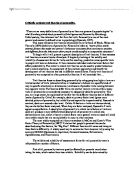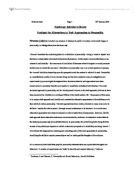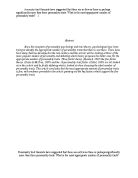minutes late for:
lecture
tutorial
coffee
person means:
Tom
-6
3
12
3
Dick
3
6
9
6
Harry
12
9
6
9
situation means:
3
6
9
6
You'll notice that the means remain the same, but there are considerable differences between the people's lateness in response to the situation. Harry is really bored by lectures and always arrives late, but Tom is really keen on them and is always early, whereas he tends to arrive very late for coffee because all his mates' smoking hurts his eyes, whilst Harry quite enjoys meeting his mates and sitting around drinking coffee and smoking.
It is not the case that the people are consistent in their lateness. There is an interaction between situation and personality. Thus, the traditional trait model has been replaced by the interactionist model of personality. Such a model does not deny that there may be generalizable aspects of a personality, but denies that they will be consistently evidenced across all situations.
So, I think it's worth saying that, however attractive you may find trait models of personality, however suggestive they may be of explanations, you do need, as always in communication, to bear the context in mind. As Argyle quite memorably expresses it (referring to Person and Situation as 'P' and 'S'):
In order to predict how a particular person will behave in a particular situation, we need to know something else
- the equation showing how P and S interact, which is of the general form
B = f(P,S)
This states that the amount of some form of behaviour is a mathematical function of personality and situation variables.
1982 : 116-7
With that caveat in mind, go ahead:
Trait theorists generally take the view that our character traits are inherited. The most famous British psychologist to take that view is Hans Eysenck.
Eysenck
Eysenck considers that there are two major dimensions of personality which account for the many different types of person we encounter. They are extroversion and introversion. As you can see from the graphic, personality is measured on the dimensions
extrovert <----> introvert
and
neurotic <----> normal (or stable)
Each of these dimensions is made up of several second-order factors:
Extroversion: activity, sociability, risk-taking, impulsiveness, expressiveness, reflectiveness, responsibility
Neuroticism: self-esteem, happiness, anxiety, obsessiveness, autonomy, hypochondriasis, guilt
When the factors are plotted against one another, we end up placing a person on the scales shown in the graphic. The quarters of the circle roughly correspond, incidentally, to the ancient Greeks' division into phlegmatic, choleric, sanguine and melancholic.)
If you would like to try to find out what your personality is according to Eysenck, you could buy Test Your Own Personality.
A criticism of Eysenck's personality theory is that it was originally developed from a very small sample only, and that that has led to oversimplification.
A further criticism is that the testing is based entirely on self-reports and is therefore likely to be heavily influenced by the respondent's mood at the time.
As you may have gathered from my comments at the beginning of this section, I am uncomfortable with the suggestion that personality tends to vary little over time and am therefore also uncomfortable with the ideas, supported by Eysenck, of inherited personality traits, in part because that notion implies that personality is unlikely to be changeable. Unhappy though I may be with that idea, I am obliged to mention that it is in fact supported by studies of identical twins raised apart. According to Pinker (1998 : 448), personalities differ in at least five ways:
whether a person is sociable or retiring (extroversion - introversion)
whether a person worries or is calm and self-satisfied (neuroticism - stability)
whether the person is courteous or rude and suspicious (agreeableness - antagonism)
whether a person is careful or careless (conscientiousness - undirectedness)
whether a person is daring or conforming (openness - nonopenness)
According to Pinker, these traits have been tested for in dozens of studies of thousands of people all over the world and have shown that around 50% of the variation in personality has genetic causes. Only around 5% of personality differences can be accounted for by upbringing. Studies of identical twins reared apart have shown that they are alike even down to personality 'tics' such as flushing the toilet both before and after use. Conversely, unrelated children reared in the same home are about as unalike in personality as any two people picked from the population at random. You will be aware that Pinker's claims, if they can be supported, pose serious questions to cultural studies, where it is pretty much a given that most aspects of our personality are culturally conditioned.
Cattell
Cattell established his list of traits from a variety of sources and thus avoids the criticism of Eysenck's self- reporting method.
According to Cattell, there are sixteen factors of personality, all bipolar:
reserved
outgoing
less intelligent
more intelligent
affected by feelings
emotionally stable
submissive
dominant
serious
happy-go-lucky
expedient
conscientious
timid
venturesome
tough-minded
sensitive
trusting
suspicious
practical
imaginative
forthright
shrewd
self-assured
apprehensive
conservative
experimenting
group dependent
self-sufficient
uncontrolled
controlled
relaxed
tense
(source Hayes & Orrell (1993))
Cattell is often criticised for having produced an overly simplistic model. It is also objected that his system is too rigid, since certain traits may be very important for understanding some people and totally irrelevant to others. However, he himself drew attention to the variability introduced by such factors as the situation, the rôle currently being played and faking.
Adorno - the authoritarian personality
I'm not at all sure that Adorno's research belongs here, but I couldn't think of anywhere else to put it. The Authoritarian Personality arose out of research into prejudice conducted by the members of the Frankfurt School with funding from the American Jewish Committee. Adorno worked on the project with a group of psychologists from Berkeley who sent out questionnaires to over 2000 respondents. The answers were classified so that they placed individuals on a scale of A-S (anti-Semitism E (ethnocentrism), PEC (political- economic conservatism) and F (potentially fascist). This was then followed up by individuals who scored high and low on the scale. The following are the characteristics of the authoritarian personality:
Conventionalism
Rigid adherence to conventional, middle-class values
Authoritarian submission
Submissive, uncritical attitude toward idealized moral authorities of the in-group
Authoritarian aggression
Tendency to be on the lookout for, and to condemn, reject, and punish people who violate conventional values
Anti-intraception
Opposition to the subjective, the imaginative, the tender-minded
Superstition and stereotypy
the belief in mystical determinants of the individual's fate; the disposition to think in rigid categories
Power and 'toughness'
Preoccupation with the dominance-submission, strong-weak, leader-follower dimension; identification with power figures; overemphasis upon the conventionalized attributes of the ego; exaggerated assertion of strength and toughness
Destructiveness and cynicism
Generalized hostility, vilification of the human
Projectivity
The disposition to believe that wild and dangerous things go on in the world; the projection of unconscious emotional impulses
Sex
Exaggerated concern with sexual 'goings-on'








